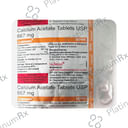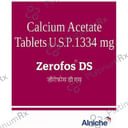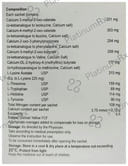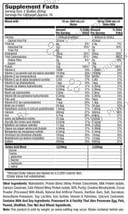Calcium Acetate
Uses
Calcium acetate is used in the treatment of high phosphate levels in the blood.
How it Works
How Calcium Acetate works Calcium Acetate contains calcium acetate that binds with the phosphate in the food you consume, allowing it to be eliminated from the body without absorption. This process helps reduce high levels of phosphate in the blood.
Side Effects
Common side effects of calcium acetate include increased calcium levels in the blood, nausea, and diarrhea.
Expert Advice
- Calcium Acetate is used to manage elevated phosphorus levels in individuals with kidney disease who are undergoing dialysis.
- Consult your doctor before using an antacid that contains calcium while taking this medication.
- Do not take additional calcium supplements unless advised by your doctor during treatment with Calcium Acetate.
- If you are on thyroid medication, take Calcium Acetate 4 hours before or 4 hours after your thyroid medication.
- Avoid taking any antibiotics concurrently with Calcium Acetate; maintain a gap of 1-2 hours between these medications.
Related Medications
Calcium Dl2 Hydroxy 4 Butyrate 177mg + Calcium 3 Methyl 2 Oxo Butirate 258mg + Calcium 3 Methyl 2 Oxo Valerate 201mg + Calcium 4 Methyl 2 Oxo Valirate 303mg + Calcium 2 Oxo 3 Phenylpropionate 204mg + L-histidine 114mg + L-lysine Acetate 315mg + L-threonine 159mg + L-tryptophan 69mg + L-tyrosine 90mg

₹108

₹100.9
MRP ₹123
Calcium Acetate 667mg
₹39.7

₹58.6
MRP ₹117.2
Calcium Acetate 667mg

₹58.6
MRP ₹117.2
Calcium Dl2 Hydroxy 4 Butyrate 177mg + Calcium 3 Methyl 2 Oxo Butirate 258mg + Calcium 3 Methyl 2 Oxo Valerate 201mg + Calcium 4 Methyl 2 Oxo Valirate 303mg + Calcium 2 Oxo 3 Phenylpropionate 204mg + L-histidine 114mg + L-lysine Acetate 315mg + L-threonine 159mg + L-tryptophan 69mg + L-tyrosine 90mg

₹100.9
MRP ₹123
Calcium Acetate 667mg

₹42

₹58.6
MRP ₹117.2
Calcium Acetate 667mg

₹63

₹58.6
MRP ₹117.2
Calcium Acetate 667mg

₹48

₹58.6
MRP ₹117.2
Calcium Acetate 667mg

₹54

₹58.6
MRP ₹117.2
Calcium Acetate 667mg

₹35

₹58.6
MRP ₹117.2
Calcium Acetate 667mg
₹49

₹58.6
MRP ₹117.2
Calcium Acetate 667mg

₹75.5

₹58.6
MRP ₹117.2
Calcium Acetate 667mg

₹20.3

₹58.6
MRP ₹117.2
Calcium Acetate 667mg
₹43.3

₹58.6
MRP ₹117.2
Calcium acetate

₹130
Calcium Acetate 1334mg

₹71
Calcium Pantothenate + Folic acid + Niacinamide + Pyridoxine HCl + Riboflavin + Spirulina + Thiamine Mononitrate + Tocopherol Acetate

₹1,590
Alpha ketoanalogue + Calcium-3-methyl-2-oxo butyrate + Calcium-3-methyl-2-oxovalerate + Calcium-4-methyl-2-oxovalerate + Calcium-2-oxo-3-phenylpropionate + Histidine hydrochloride monohydrate + L-lysine acetate + L-threonine + L-tryptophan

₹333
Calcium Citrate + L-Carnitine L-Tartrate + Magnesium Hydroxide + Vitamin B12 + Vitamin D3 + Vit. E (Acetate) (50% As powder)

₹285
Calcium-3-methyl-2-oxo-valerate (?-ketoanalogue to isoleucine + Calcium-4-methyl-2-oxo-valerate (?-ketoanalogue to leucine + Calcium-3-methyl-2-oxobutyrate (?-ketoanalogue to Valine + Calcium-2-oxo-3-phenylpropionate (?-ketoanalogue to phenylalanine + Calcium-DL-2-hydroxy-4-(methylthio) butyrate (?-hydroxyanalogue to methionine + Calcium salt) + Calcium salt) + Calcium Salt) + Calcium salt) + Calcium salt) ime + L-Histidine USP + L-Lysine Acetate USP (Eq. to L-Lysine 225 mg) + L-Threonine USP + L-Tryptophan USP + L-Tyrosine + Total Nitrogen content per sachet and Calcium. + USP

₹276
Calcium caseinate + Creatine monohydrate + Maltodextrin + Milk protein isolate + Natural and artificial flavours + Protein blend + Soy lecithin + Sucralose + Vitamin A acetate

₹5,391
Calcium caseinate + Creatine monohydrate + Maltodextrin + Milk protein isolate + Natural and artificial flavours + Protein blend + Soy lecithin + Sucralose + Vitamin A acetate

₹6,315
Calcium caseinate + Creatine monohydrate + Maltodextrin + Milk protein isolate + Natural and artificial flavours + Protein blend + Soy lecithin + Sucralose + Vitamin A acetate

₹5,391
Calcium Phosphate 130mg + Dextrose 5gm + Magnesium Hydroxide (Milk Of Magnesia) 21mg + Potassium Chloride 0.315gm + Sodium Acetate 0.031gm + Sodium Metabisulphite 26mg

₹18.1
Ascorbic acid + Calcium Pantothenate + Copper + Folic acid + Manganese + Niacinamide + Pyridoxine hydrochloride + Riboflavin + Thiamine mononitrate + Vitamin A + Vitamin B12 (Methylcobalamin) + Vitamin E acetate + Zinc

₹92
Calcium Citrate + Chromium (Chromium Picolinate) + L-Carnitine + Magnesium Aspartate + Potassium Citrate + Vitamin B5 (Calcium Pantothenate) + Vitamin B6 (Pyridoxine Hydrochloride) + Vitamin B1 (Thiamine) + Vitamin B12 (Vitamin B12 (Methylcobalamin)) + Vitamin D (D3) + Vitamin E (Acetate)

₹261
Flat ₹100 off on first app order | Use Code: APP100 |
Flat ₹100 off on first app order
USE CODE: APP100

Download Now